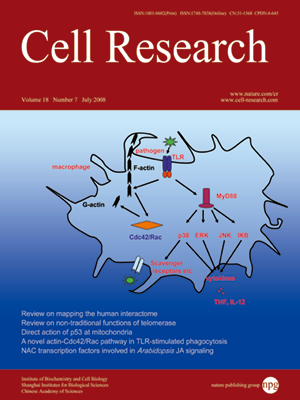
Volume 18, No 7, Jul 2008
ISSN: 1001-0602
EISSN: 1748-7838 2018
impact factor 17.848*
(Clarivate Analytics, 2019)
Volume 18 Issue 7, July 2008: 780-791
ORIGINAL ARTICLES
Activation of the PI3K/AKT pathway mediates FSH-stimulated VEGF expression in ovarian serous cystadenocarcinoma
Yan Huang1, Keqin Hua1, Xianrong Zhou1, Hongyan Jin1, Xiaojun Chen1, Xin Lu1, Yinhua Yu2, Xiliang Zha3 and Youji Feng1
1Department of Gynecology, Obstetrics and Gynecology Hospital of Fudan University, 419 Fang Xie Road, Shanghai 200011, China;
2Department of Experimental Therapeutics, The University of Texas, MD Anderson Cancer Center, Houston, TX, USA;
3Department of Biochemistry and Molecular Biology, Shanghai Medical College of Fudan University, Shanghai, China
Correspondence: Youji Feng(fengyj4806@sohu.com)
There is evidence to suggest that follicle-stimulating hormone (FSH) can facilitate the neovascularization of ovarian cancers by increasing vascular endothelial growth factor (VEGF) expression in cancer cells, although the underlying molecular mechanism of this process is not well known. Therefore, we investigated the effect of FSH on VEGF expression in the ovarian cancer cell lines SKOV-3 and ES-2. Treatment with FSH significantly increased VEGF expression in a dose- and time-dependent manner. In addition, FSH treatment enhanced the expression of survivin and hypoxia-inducible factor-1 (HIF-1α). Knockdown of survivin or HIF-1α suppressed VEGF expression, but only knockdown of survivin inhibited FSH-stimulated VEGF expression. Pretreatment with LY294002, a phosphoinositide 3-kinase (PI3K)/AKT inhibitor, neutralized the enhanced expression of survivin induced by FSH, but treatment with U0126, a mitogen-activated protein kinase/extracellular signal-regulated kinase inhibitor, had no such effect. We further showed that ovarian serous cystadenocarcinoma samples had much higher incidence of positive AKT and phosphorylated AKT (pAKT) protein staining than did benign ovarian cystadenoma samples (
p < 0.01). The 5-year survival rate was only about 15% in patients with ovarian serous cystadenocarcinoma who had AKT and pAKT expression, whereas it was about 80% in those who did not have AKT or pAKT expression. Taken together, these results indicate that FSH increases the expression of VEGF by upregulating the expression of survivin, which is activated by the PI3K/AKT signaling pathway. Understanding the role of the PI3K/AKT pathway in FSH-stimulated expression of survivin and VEGF will be beneficial for evaluating the prognosis for patients with ovarian serous cystadenocarcinoma and for pursuing effective treatment against this disease.
Cell Research (2008) 18:780-791. doi: 10.1038/cr.2008.70; published online 24 June 2008
FULL TEXT | PDF
Browse 1985


